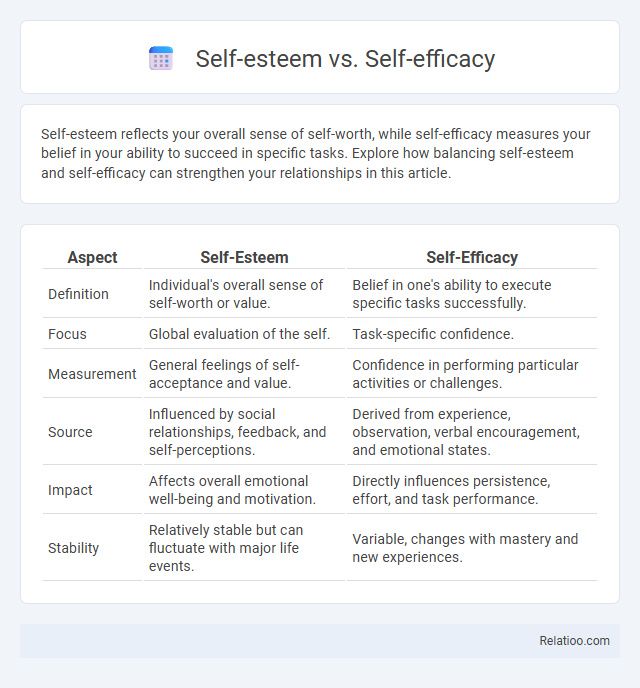Self-esteem reflects your overall sense of self-worth, while self-efficacy measures your belief in your ability to succeed in specific tasks. Explore how balancing self-esteem and self-efficacy can strengthen your relationships in this article.
Table of Comparison
| Aspect | Self-Esteem | Self-Efficacy |
|---|---|---|
| Definition | Individual's overall sense of self-worth or value. | Belief in one's ability to execute specific tasks successfully. |
| Focus | Global evaluation of the self. | Task-specific confidence. |
| Measurement | General feelings of self-acceptance and value. | Confidence in performing particular activities or challenges. |
| Source | Influenced by social relationships, feedback, and self-perceptions. | Derived from experience, observation, verbal encouragement, and emotional states. |
| Impact | Affects overall emotional well-being and motivation. | Directly influences persistence, effort, and task performance. |
| Stability | Relatively stable but can fluctuate with major life events. | Variable, changes with mastery and new experiences. |
Understanding Self-Esteem: Definition and Core Concepts
Self-esteem refers to an individual's overall subjective evaluation of their own worth, encompassing beliefs about oneself along with emotional states such as triumph, despair, pride, and shame. It plays a crucial role in mental health, influencing motivation, resilience, and interpersonal relationships. Unlike self-efficacy, which focuses on confidence in specific abilities, self-esteem is broader and more reflective of self-value, while self-discovery involves the ongoing process of gaining insight into one's identity and values.
Exploring Self-Efficacy: Meaning and Significance
Self-efficacy, defined by psychologist Albert Bandura as the belief in one's ability to succeed in specific situations or accomplish tasks, plays a crucial role in motivation, learning, and psychological resilience. High self-efficacy enhances problem-solving skills and promotes greater perseverance when facing challenges, contrasting with self-esteem, which broadly reflects overall self-worth, and self-discovery, which involves the ongoing process of gaining insight into one's identity and values. Understanding self-efficacy empowers individuals to take proactive steps toward goal achievement by fostering confidence and reinforcing adaptive behaviors.
Key Differences Between Self-Esteem and Self-Efficacy
Self-esteem reflects Your overall sense of self-worth and personal value, whereas self-efficacy refers to Your belief in Your ability to accomplish specific tasks or goals. Self-esteem is more global and emotional, influencing how You view Yourself across various situations, while self-efficacy is task-specific and impacts motivation and persistence in distinct activities. Both concepts shape Your behavior, but self-efficacy drives performance, and self-esteem shapes Your general confidence and emotional well-being.
Origins and Development of Self-Esteem
Self-esteem originates from early childhood experiences, shaped by validation, social interactions, and perceived competence, forming a foundation for your self-worth. While self-efficacy stems from belief in your ability to accomplish tasks, and self-discovery involves exploring your identity and values, self-esteem develops through consistent feedback and emotional support during formative years. Understanding the developmental roots of self-esteem highlights its critical role in influencing emotional resilience and personal growth.
Sources and Development of Self-Efficacy
Self-efficacy develops primarily through four sources: mastery experiences, vicarious experiences, verbal persuasion, and physiological states. Mastery experiences, or personal successes, have the strongest influence by directly reinforcing one's belief in their capabilities. Observing others' successes, receiving encouragement, and interpreting physical and emotional states also shape self-efficacy, which distinguishes it from self-esteem's focus on self-worth and self-discovery's exploration of personal identity.
Impact of Self-Esteem on Personal Growth
Self-esteem significantly influences your personal growth by shaping your confidence and motivation to pursue goals, enabling resilience in the face of challenges. Unlike self-efficacy, which relates to your belief in specific abilities, self-esteem affects your overall sense of worth and acceptance, driving continuous self-improvement. Engaging in self-discovery deepens your understanding of values and passions, but high self-esteem is crucial for sustaining the courage to explore and embrace transformative experiences.
The Role of Self-Efficacy in Achieving Goals
Self-efficacy plays a crucial role in achieving goals by directly influencing your confidence in performing specific tasks and overcoming obstacles. Unlike self-esteem, which reflects your overall sense of self-worth, self-efficacy is task-specific and drives motivation, persistence, and resilience. Developing strong self-efficacy enhances goal-setting, decision-making, and problem-solving abilities, making it a key factor in personal growth and successful self-discovery.
Relationship Between Self-Esteem and Self-Efficacy
Self-esteem refers to one's overall sense of self-worth, while self-efficacy is the belief in one's ability to succeed in specific tasks, both playing crucial roles in personal development. Higher self-efficacy often boosts self-esteem by providing individuals with confidence through demonstrated achievements and competency. Self-discovery supports the growth of both by fostering awareness of strengths and limitations, enhancing self-perception and motivation.
Strategies to Improve Self-Esteem and Self-Efficacy
Boosting self-esteem involves practices such as positive self-talk, setting realistic goals, and celebrating personal achievements to reinforce a healthy self-image. Enhancing self-efficacy requires mastery experiences, social modeling, and verbal encouragement to build confidence in specific skills and tasks. Integrating mindfulness and reflective journaling supports self-discovery by fostering awareness of strengths and areas for growth, which indirectly benefits both self-esteem and self-efficacy.
Importance of Balancing Self-Esteem and Self-Efficacy in Life
Balancing self-esteem and self-efficacy is crucial for personal growth, as high self-esteem fosters self-worth while strong self-efficacy drives confidence in achieving goals. Self-discovery serves as a foundational process that helps individuals understand their strengths and limitations, enabling a harmonious development of both self-esteem and self-efficacy. Without this balance, individuals may either overestimate their abilities or undervalue their potential, hindering effective decision-making and resilience in challenges.

Infographic: Self-esteem vs Self-efficacy
 relatioo.com
relatioo.com